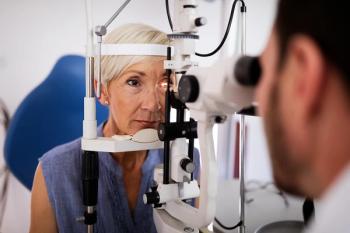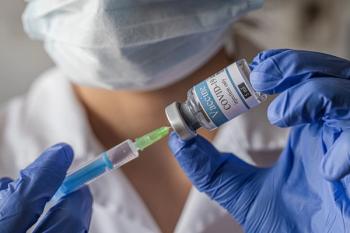
EnVision Summit 2024: Incorporating diversity, family into eye care meetings with Dr Bonnie An Henderson
Bonnie An Henderson, MD, cofounder of EnVision Summit, sits down with Optometry Times to detail the upcoming event that takes a unique, family-friendly approach to centering diversity in the eye care profession.
With EnVision Summit 2024 on the horizon, the meeting's cofounder Bonnie An Henderson, MD, outlines its purpose of family inclusion and highlighting diverse backgrounds. She sat down with Optometry Times to share what's new at this year's meeting, running from February 16 to 19 in Puerto Rico.
Video Transcript
Editor's note: This transcript has been lightly edited for clarity.
Emily Kaiser Maharjan:
Hi everyone, I'm here with Bonnie Henderson, program director and cofounder of the EnVision Summit. Welcome Dr Henderson. I'm so glad that you could join us.
Bonnie An Henderson, MD:
Well, thank you so much, Emily. Please feel free to call me Bonnie.
Kaiser Maharjan:
Alright, Bonnie. So first, can you tell us what's new and exciting at the 2024 EnVision Summit?
Henderson:
Absolutely. So first of all, thank you so much for having me on and talking about EnVision. EnVision Summit is very near and dear to my heart, and I'd love to share information about it. So what's new this year at EnVision Summit is that we are focusing [on] what we usually focus on, which is the amazing science and clinical work that ophthalmologists do. Of course, we focus on having a very casual family-friendly environment, but also empowering women leaders and giving them a chance to network with each other, and to be on the podium and to get involved in in clinical trials, to get involved in research projects together.
So that's what we always do, but what's new and different this year is that we have this amazing optometry program that we're starting. I'm really excited about it because we've had so many questions about, "Can we have a concurrent program that is really focused on educating optometrists?" So I'm excited about it this year, I'm really hoping that it will be well received and well attended.
We hold it every February, it's Presidents' Day weekend. We hold it in Puerto Rico, so it's nice and warm. Remember, Puerto Rico is a US territory, you don't need a passport, you don't need a visa. We choose Puerto Rico because they've been hit with a lot of natural disasters of the recent past. It's a way to help the community as well, and bring in the colleagues from the continental US, as well as from North, South, and Central Americas as well. So please join us, and we're really looking forward to having you participate in EnVision Summit.
Kaiser Maharjan:
Yeah, that sounds so exciting. So can you tell me a little bit more about how the optometry program came about?
Henderson:
Absolutely. So I've been working with our CME provider, which is Physicians' Education Resource; they're part of MJH Life Sciences, and they have been our accreditation partner for this upcoming year. As part of that company, I met this amazing optometrist Dr Peg Achenbach, and she was instrumental in helping me brainstorm about putting this program together. She really tapped into the fact that a lot of optometrists out there really are looking for this type of education, not only really good science, but also the ability to network with other female optometrists, as well as male optometrists too, and ophthalmologists, together. She really was the one that helped me think through this and figure out what type of program would be very useful and very helpful. She introduced me to Dr Cecilia Koetting and Dr Danica Marrelli, as they are the chairs of the program. They have put together a fantastic program with wonderful speakers and really, really interesting topics. So, I'm thrilled to see this launch. I'm really hoping that people really enjoy the content and really learn from being together.
Kaiser Maharjan:
Absolutely, and what is it about the EnVision Summit that keeps you engaged as program director?
Henderson:
Sure, so there are many meetings out there, so almost every weekend, you can find a ophthalmology or optometry meeting. They are ubiquitous nowadays, so it's easy to find a meeting. However, what I love about EnVision is that it's a very different atmosphere. Not only do you still get really high quality speakers and high quality topics about real ophthalmology and optometry, but you also get it in a really amazing supportive, casual environment.
I think the the unique aspect about EnVision Summit is that it is really family-friendly, so whether you're male or female, whether you have many kids or no kids, people tend to bring their spouse, their children, and you don't stash them away in the hotel room while you go and listen to the talks. Instead, they're incorporated into the weekend. So all the meals, the breaks, all the events are really welcome to the families of the participants. I think that's really unique because up until now, I think there's been this really big separation between what a meeting is, meaning that you have to see it and sit in in a ballroom or auditorium by yourself, and it's almost always on a weekend, so your spouse, your children are suffering because they're away at home or even if they're with you they're not with you at that time. So it's been really unique to bring them into the entire meeting program so that your children could actually see their mom or their dad on the podium and they can see their role model speaking about ophthalmology, and they really get a sense of what their parent does.
I think it's inspiring for the children. I think it's really healthy for the parent who's a physician. We start to rethink what our job is, and we talk about work life balance, but this is really living work life balance. It's not just talking the talk, it's really walking the walk. I do hope that medical meetings in the future really evolve into something like this. It shouldn't have this big separation where, you know, before I think a generation or two ago, the spouse usually was a stay-at-home spouse, and they were at home, and they watched the kids. Often times, it was the man who was a physician, and they would go off on to this conference. Well, that's really different now, and I think the caretaker is male or female, and they could be a parent. So I don't think it's reasonable to really expect the patient care provider to actually leave their home, especially on a weekend, and to do this many weekends a year. I think it's much smarter. It lends to job satisfaction and happiness throughout their whole life, their holistic life. I'm hoping that this becomes a healthier way to attend a medical meeting.
Kaiser Maharjan:
Absolutely. I know you just talked a lot about how the EnVision Summit goes above and beyond to be family-friendly. How do you feel like this enriches the experience?
Henderson:
I think it's a really enriching experience to have both the physician program, but also we have a youth program that runs at the same time. We always have a room that's a youth room, or a kid's room, that's connected to the lecture hall. You don't have to be worried about what your child is doing, they literally are right next door. In that room, we have programming specifically for children, it could be as young as toddlers, all the way up until teens. We have things like face-painting and magicians, but we also have things like yoga for teens or life skills, how to give a presentation. Even things like, how do you study for standardized tests, or how do you think about college prepping? Those types of ideas and fun activities are really incorporated, so it allows the age-appropriate youth participant, to be fully engaged and to be excited.
This is our fifth year, and what I'm thrilled to see is that the children of the physicians, they come back every year, and now they've made friends and they are growing up together. They're so excited to come back to EnVision Summit because they can see their friends. They are having a ball or that weekend, so they're off swimming together, or running around together, or watch the movie together. Then that way, the parents feel really good about the fact that their children and their families are also equally engaged, while they're really educating themselves and continuing medical education. I think it's a really great marriage between the two.
Kaiser Maharjan:
Absolutely, that's so heartwarming. It's just so wholesome, I love it. There's also a huge emphasis on women empowerment at EnVision, how does this translate into the educational program?
Henderson:
Sure. So what you'll notice in this program, if you didn't actually see the faces or the names of the speaker, you would not be able to tell that this would be any different than an American Academy of Ophthalmology meeting, for example. The topics are really relevant, they're fantastic. The talks are amazing, but what you will notice that if you actually do look at the names of the speakers and the program committee, you will notice that the majority of the program committee members are women, and the majority of the speakers are women. What that allows women to do is allows them to actually be on the podium.
The reason why I think it's really important, in this day and age, you would think, "Well, why don't we meet that need that? Women have plenty of opportunities, it's equal, there's no need for this type of meeting." I've heard that comment many times, but what you realize is when you go to a national meeting or a regional meeting for ophthalmology, you notice that even if it's 50/50 of the people in the audience are men and women, the people who are on the podium, the people who are making the decisions, the people on the program committee, the people on the boards of these organizations, the majority are still men. I love men, I'm married to a man, I have sons, so I have nothing against men, but the idea is it would be great to have equal representation in the board seats and on the podium that are equally represented in the audience. If in the audience you have 50/50 men and women, I think the speaker should also be equal and the leadership should be equal, that way you have equal representation, and you have a diverse opinion about what topic should be given, who should speak.
I think that having that type of diversity is really, really important to make sure you have a very balanced program. That's really the goal, is to make sure that the program is very reflective [of] what what people want to hear, what people want to learn. The best way to do that is to make sure that the people making the decisions about the topics and the speakers are also coming from diverse backgrounds.
Kaiser Maharjan:
Absolutely. Diverse voices just enrich the content, helps us delve deeper, makes us all better, smarter, happier humans.
Henderson:
So one of the things that I want to highlight is we talk about gender a lot, but really, when you look at the speakers, you'll notice that there's also diversity in backgrounds too. So it's not really just men and women, but you'll see people of different ethnic backgrounds, religious backgrounds, you'll see all different types of people on our speaker list. It's really enriching to have a program and speakers that really reflect the practitioners. I think that that's incredibly important as we move forward in medicine.
Kaiser Maharjan:
Absolutely. I could not agree more. Is there anything else that you'd like to share?
Henderson
Sure. There's two other new things that I wanted to highlight about this year. One is that Dr Malvina Eydelman ... for ophthalmology, she's the director of the FDA for Ophthalmic Devices, she has put together two incredible new sessions. The first is a leadership session on Friday morning and it's open to everybody. It's entitled, "Breaking That Glass Ceiling," and she's brought in amazing speakers to talk about, what is that glass ceiling, is it still there, how do we break through it? The second is a session on Saturday afternoon with Dr Mildred Olivier and Dr Leslie Jones, and they have put together a session about advancing health equity. It's really focusing on how do we promote health equity for our patients. So what I mean by that is that when we look at the studies that are being done, for example, when we do research studies to look at new medications or new devices, we want to make sure that those studies are done on different populations of patients. So you don't want a study that only looks at people of one particular ethnic background and one race because then the effect and the outcomes of the results of that study may be very different for people from a different ethnic background. When we look at clinical trials, I think it's really, really important that we look at diversity in terms of clinical trials.
So what that session is doing is to make sure that when clinician scientists like ourselves, we think about what studies should we perform, what do we need to do to investigate new products, new techniques, we also think about who are our patients and how do we make sure that every patient gets equal care? So care should not be delivered based on what is your socioeconomic class, you know, what can you afford? What do you look like? What is your race? What car do you drive? What's your zip code? It really should be delivered equally. So I'm really excited about that session that's being led and I really hope everyone really tunes in, joins us, and supports it. It's also being cosponsored and coled by the AUPO, which is the Association of University Professors of Ophthalmology, as well as the American Academy of Ophthalmology. So, again, we invite everyone to join us and be a part of the conversation and let's learn together, brainstorm together to solve some of these issues.
Kaiser Maharjan:
That sounds absolutely fantastic. Thank you so much for your time today. Dr Henderson and I'm really looking forward to hearing more about the optometry program and EnVision summit as a whole.
Henderson:
Thank you very much Emily.
Newsletter
Want more insights like this? Subscribe to Optometry Times and get clinical pearls and practice tips delivered straight to your inbox.




























